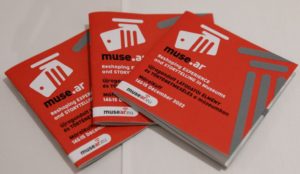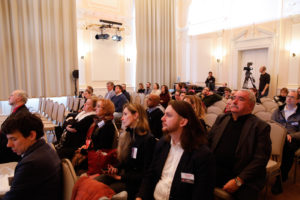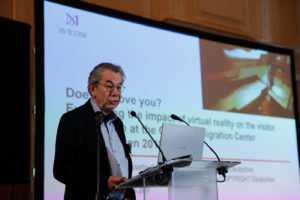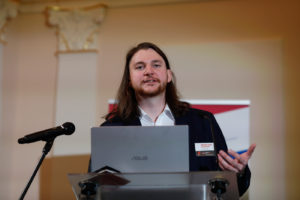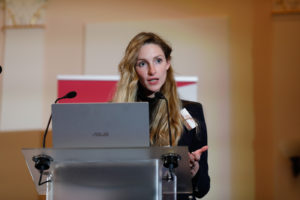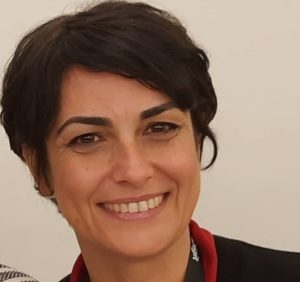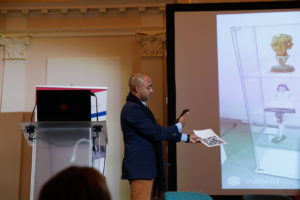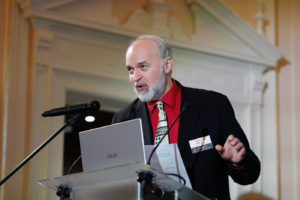December 22, 2022
Budapest 14 & 15 December 2022: “Reshaping experience and storytelling in museums”: AVICOM participated in hosting the conference.
AVICOM participated in hosting the conference “Reshaping experience an storytelling in museums” in Budapest, 14 & 15 December 2022.
As final event of the muse.ar project (co-funded by the Creative Europe Programme of the European Union) this conference took a broader look at digital developments and communication challenges in museums and aimed to bring good examples from the recent years. The focus was on interpretation and how digital planning and online presence – wether it is audience engagement or virtual exhibitions – can support or complement the work of museums.
Among the speakers the conference hosted renowned Hungarian and foreign experts who shared their experiences and thoughts about museums in the 21st century with the audience and their colleagues.
AVICOM was an associated partner of the conference and several of their representatives gave presentations. As one of their objectives was to make museum professionals aware of and better informed about the usefulness and potential of audiovisual and new technologies. Their presence guaranteed useful and meaningful opportunities for professional debate and exchange of ideas. Roundabout 70 professionals and students took part in the conference, which also was streamed.
Here the contributions of the AVICOM representatives:
Keynote speaker of the first conference day was AVICOM President Dr. Michael H. Faber (Germany): “Communication and mediation. Digital, analogue, personal? About must-have, nice to have and nonsense”.
Digital and social media promote the public perception of museums, pave new ways of outreach and enable a more intensive involvemeht of target groups in museum work. This makes the following questions all the more important: How can digital media be used sensibly? How can they make the original tangible? Have conventional mediation and communication had their day? After all, despite all the digitalisation, museums remain analogue.
Michael Louis Eulenstein (Germany) presented “The COVID-19 challenge. Museums and their digital engagement in times of crisis”.
The COVID-19 pandemic and the digital transformation are having a major impact on the museum sector. Museums were faced with the challenge of developing formats and concepts that could be played out digitally. The goal of the joint “Solidarity Project” of AVICOM, MPR and ICOM Germany, financed by ICOM, was to collect best practice examples that can serve as models, especially for small and medium-sized museums. AVICOM will publish the results of this project in January 2023.
Dr. Kamila Oles (United Kingdom) presented “Culture power to inspire development in rural areas: Virtual Orkney Northern Isles exhibit platform”.
CUPIDO Virtual Orkney North Isles was created as a shared exhibit virtual platform. The online galleries and virtual tours display the heritage of all six isles so that Orkney communities and users from around the world can virtually explore the beauty of Orkney Northern Islands’ natural and cultural legacy. Simultaneously, a touch screen and VR set showcasing the virtual exhibits have been placed on-site in the heritage centres in Orkney North Isles. The videos and audio reflect the unique atmosphere and climate determined by Orkey’s natural elements, such as wind, ocean, sea birds and the ancient native Orkney sheep.
Dr. Anna Maria Marras (Italy) presented “Concersational assistants, chatbot: how language technologies interact in the everyday life of GLAM institutions”.
The term ‘conversational interface’ indicates a set of human-machine interfaces based on dialogue which includes: This type of technology is continuously developing and improving and can be excellent applications for museums as well. The presentation explored the history of these applications in the museums and GLAM institutions, telling their evolution and highlighting future applications.
Ph.D. Mohamed Ismail Ibrahim (Egypt) spoke about the “Virtual Museum of Tutankhamun”.
The use of immersive virtual reality (VR) systems in heritage can allow users to visit inaccessible sites, as well as can allow both greater richness and diversity in content. The concept of the Tutankhamun Virtual Museum is to give certain extended reality experiences that emphasize some aspects of Tutankhamun’s stories and treasures in an appealing and educational manner, such as virtual visits, 360-degree video, mixed reality, augmented reality, and hologram.
MgA. Aleš Kapsa (Czech Republic) informed about “The Labyrinth and the Theatre on the Stage of the World”:
The video mapping Labyrinth of the World and Paradise of the Heart and the film Theatre of the World are the current museum audiovisual adaptions of Comenius’ work in the new permanent exhibition On the Stage of the World – Jan Amos Komenský and His Time. The exhibition opened on 28 March 2022 at the J.A. Comenius Museum in Uherský Brod on the occasion of the 430th anniversary of the birth of the thinker, philosopher and writer. Kapsa’s paper offered a reflection on artistic and technical approaches to the adaption of timeless historical content within a modern museum presentation.
You will find more at: https://musear-platform.com
